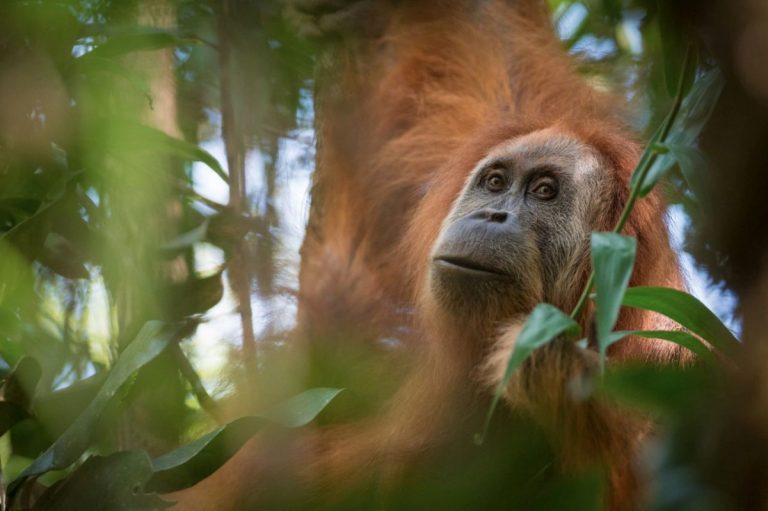
An eighth great ape was officially recognised last week, with the scientific discovery of a new species of orangutan on Indonesia’s Sumatra island.
A study published in the scientific journal Current Biology documents the Pongo tapanuliensis or Batang Toru orangutan – of which there are only 800 alive – found to be distinct from the Bornean and Sumatran orangutans.

Skulls of the Batang Toru orangutan. Source: Current Biology
“It has a smaller skull, but larger canine teeth than other orangutan species,” said one of the study’s authors Anton Nurcahyo, a PhD scholar at the Australian National University’s School of Archaeology and Anthropology.
Extremely low numbers make the Batang Toru orangutan the rarest and most endangered of all the species of great apes, a categorisation which also includes the chimpanzee, bonobo and eastern and western gorillas – all found in Africa.
“It’s a very significant discovery,” said Professor Colin Groves, another author of the paper from ANU who has discovered more than 50 species throughout his career.
“The orangutan is one of our closest living relatives and we’ve now found there is more diversity within orangutans than we knew,” he added. Genomic analysis indicates that the Batang Toru orangutan diverged from the Sumatran orangutan species some 3.4 million years ago.
With the Batang Toru orangutan living near Lake Toba in Indonesia, the discovery was proudly shared across the social media accounts of Indonesian government departments last week.
1) Nah berdasar penelitian, #OrangutanTapanuli di Batang Toru-Sumut kini telah dinobatkan sbg spesies baru orangutan loh. Ini dia ciri2nya! pic.twitter.com/i66fbKGQyA
— Kementerian Sosial RI (@KemensosRI) November 3, 2017
But the study’s authors warn that vital action should be taken to prevent the animal’s small population from extinction.
“We believe the population is no more than 800. They live in a very limited area of around 100,000 square hectares. We need to protect the small amount of habitat these orangutans have left,” said Nurcahyo.
Batang Toru orangutans are primarily threatened by “road construction, illegal clearing of forests, hunting, killings during crop conflict, and trade in orangutans,” reads the paper.
The research was a major undertaking by 34 institutions including the Sumatran Orangutan Conversation Programme (SOCP), the University of Zurich, Bogor Agricultural University (IPB) and the Liverpool John Moores University.
“We have proposed that the Tapanuli orangutans be categorised as critically endangered species by the International Union for Conservation of Nature,” said Puji Rianti, a researcher from IPB as quoted by the Jakarta Globe.
https://twitter.com/jamesaaskew/status/926118376618860545
The researchers warn that a large new hydrodam project in Sumatra threatens to damage up to an estimated eight percent of the Batang Toru ecosystem.
“This dam [will] cause huge environmental damage, fragmentation and isolation of sub-populations of this unique population of orangutans and several other Critically Endangered species,” said SOCP in a statement. “It will also negatively affect the indigenous communities living in and around this important water catchment area.”
On Friday, Indonesia’s Environment Ministry said that it would send a team to the jungle in Batang Toru to ensure no development projects will impede upon the orangutans’ habitat.
Liked this? Then you’ll love…
Why life sciences are a smart degree choice for entrepreneurial students







